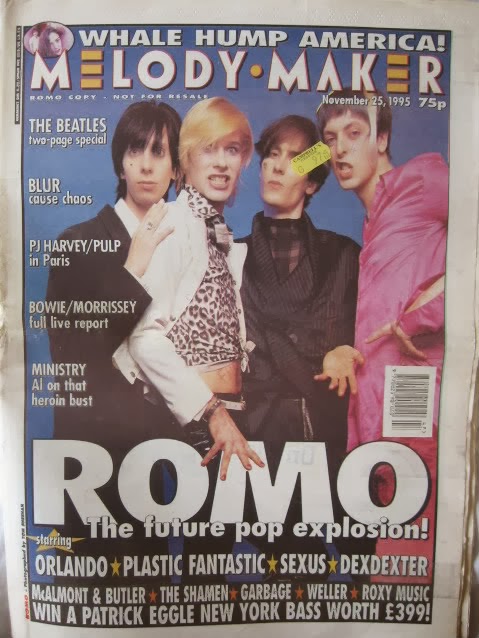Adam Curtis,
in the New Statesman a fortnight ago, talking about "static culture" and the zombie-fication of rock:
"
All culture always goes back and feeds off the past...
but there are two ways of doing it. Either you can go back and get
inspiration from the past and create something genuinely new... What bothers me at the moment is that you get a very different sense out of pop culture, which is that it is literally like a form of
archaeology. It's going back and rebuilding it almost as a sort of work
of art in itself. .. It’s not just in pop music, you get
it in a lot of avant-garde art at the moment. There are people going
back and making plays based on Fassbinder films of the 1970s, and
they're just literally replicating it, and it's very odd. And that's why
I was being a bit rude about Savages because, whilst Savages are
technically extremely good, and live are extremely powerful, they are a
bit like archaeologists from the 1920s, going back and digging up the
tomb of Tutankhamen, and laying it all out for you to see, but they’re
digging up The Slits, or New Order, or Siouxsie Sioux, and presenting it
to us, and that's it.... What I'm really complaining about is a lack of progressive
ideas in music. Everything seems to be about just going back and
reworking it and it becomes static – sort of like a zombie culture. As I
listen to Savages, I have a terrible vision of Siouxsie Sioux coming
towards me like a zombie. And nothing will kill that kind of music,
because, and this is rude, but what is now called post-punk – that
slightly angular stuff that borrowed off punk but took stuff from funk
and all sorts of other devices – had its time and had its place. At the
moment it’s just being reworked and it doesn't have any meaning to it."
Seem to remember him going on about this in
an interview last year, and again mentioning Savages as culpable. He seems to have a bit of a fixation about them!
(Have to say also that, while I'm sure he's worked all this stuff out for himself, it is a little surprising nobody appears to have pointed out to him that there's this chap what wrote a whole
book about this very topic).
(Interesting also, that like
some of
us, Curtis takes a little heart from the now-pop, the NOW!-ism of radio dance divas - in his case, Rihanna).
And here he is again, Mr Curtis - in the latest issue of
The New Humanist, approaching the same subject from a different angle.
It's a a cover story interview by New Humanist editor Daniel Trilling (formerly of New Statesman, funnily enough) and this time the mise en scene is not neo-postpunk music but Brutalist architecture - the Thamesmead Estate, "a vast modernist housing development built from the late 1960s by the now defunct GLC" as Trilling puts it - born out of technocratic optimism, for a long while thereafter seen as the acme of urban decay and social engineering hubris, but now increasingly gazed wistfully at as "the last outpost of a wave of 20th-century progressivism".
Prompting Curtis to muse thusly:
"They wanted to take rational ideas and use them as an inspiration to cut through the mist and the fog of conservatism to make the world a better place. utopian thinking was a kind of kick-start for that."
Ah, so in this case, echoing, unwittingly, Owen Hatherley ;)
But it's all good acerbic stuff. More from the
New Statesman piece:
"
Why do you think we’ve got so many zombie movies? It's quite obvious –
it's so obvious when you know it – it's because the dead won't go away.
We are surrounded by the dead. Okay, The Stone Roses are
touring live, but it’s a dead album. There’s a lot of music – like Kurt
Cobain and all these people – they’re dead. The Rolling Stones; the
music is dead, but it won’t go away. It's constantly replayed to us, and
it is like zombie culture. So many things just go back and dig up the
bloody grave. I'm sorry, but that's what Savages do."
"
All the so-called radical art that was around in the last two Manchester
festivals I've been at could have been done in 1919 by Marcel Duchamp.
That’s not to say it’s bad, but to pretend that it is somehow a new
radical vision of the world is wrong and it's reinforcing what's been
around since the early days of modernism.... This idea that somehow art can point the way to the future is
not what seems to be happening to me at the moment. Art is stuck in the
past, just like music is stuck in the past, and journalism is stuck in
the past."
"
All these radicals – including myself – we think we are somewhere radical but actually we are deeply, deeply, deeply
conservative at the moment. And what has a veneer of radicalism is
actually possibly the most conservative force at the moment. By that I
mean radical culture, art, music and a lot of radical journalism and
radical politics – whilst none of it is bad – its mechanisms, and ways
of seeing the world are borrowed from the past and its stuck in the
past. It’s stuck with a nostalgia for a radicalism of the past and
that’s not the radicalism that’s necessary"
"
It’s quite exciting because you know it can't go on like this. Something is going to come along"

























